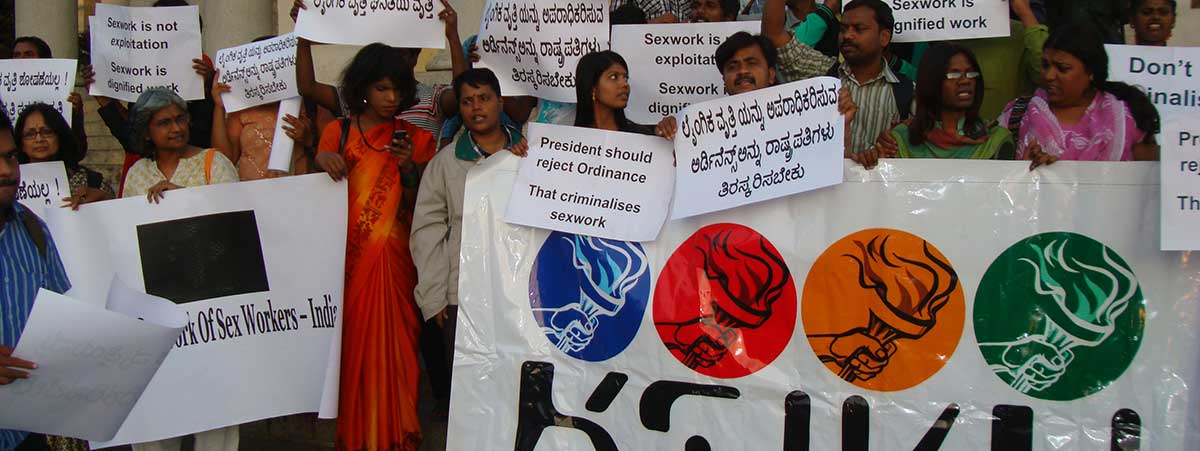Resources
Information Regarding Rights and Status of Sex Workers

Sex Work and the Law: The Case for Decriminalisation
Dialogue around the South Africa-based 2010 Soccer World Cup, proposals to introduce a moratorium on the harassment of sex workers by the South African Police Force, and the continued criminalization of sex workers and their clients in South Africa sparked the production of this work. It outlines several key issues, considerations, challenges and recommendations for policy-makers, NGOs, sex workers and other actors in the fields of HIV and human rights, to help build a supportive and enabling environment for sex workers to realise their rights. The World AIDS Campaign would like to thank the Sex Worker Education and Advocacy Taskforce (SWEAT), the New Zealand Prostitutes Collective (NZPC) and Marlise Richter in particular for their time, effort, support and input into these factsheets.
Impact of Decriminalisation on the Number of Sex Workers in New Zealand
Gillian M. Abel, Lisa Fitzgerald, Cheryl Brunton, Journal of Social Policy, Vol 38, Issue 3, Jul 2009
In 2003, New Zealand decriminalised sex work through the enactment of the Prostitution Reform Act. Many opponents to this legislation predicted that there would be increasing numbers of people entering sex work, especially in the street-based sector. The debates within the New Zealand media following the legislation were predominantly moralistic and there were calls for the recriminalisation of the street-based sector. This study estimated the number of sex workers post-decriminalisation in five locations in New Zealand: the three main cities in which sex work takes place as well as two smaller cities. These estimations were compared to existing estimations prior to and at the time of decriminalisation. The research suggests that the Prostitution Reform Act has had little impact on the number of people working in the sex industry.
Even If We Start Now, We Have Much to Do for Sex Workers
Tehelka Vol. 8 Issue 07 2011, Oishik Sircar
Vocational training is fine, but sex workers have been fighting for rights.
Secret and Lies: Tackling HIV among Sex Workers in India
The Guardian, Jun 07, 2011, Kevin E.G.Perry
Protecting the rights of women who work as prostitutes is one of the best ways to prevent the spread of HIV. And in Orissa, India, that approach is working – even amid deep-rooted taboos.
A Descriptive Profile of Abused Female Sex Workers in India
Journal of Health, Population and Nutrition, Vol.28 No.3, Jun 2010, Subadra Panchanadeshwaran, et al.
This descriptive study presents the profiles of abused female sex workers (FSWs) in Chennai, India. Of 100 abused FSWs surveyed using a structured questionnaire, severe forms of violence by intimate partners were reported by most (98%) respondents. Of the total sample, 76% experienced violence by clients. Sexual coercion experiences of the FSWs included verbal threats (77%) and physical force (87%) by intimate partners and forced unwanted sexual acts (73%) by clients. While 39% of the women consumed alcohol before meeting a client, 26% reported that their drunkenness was a trigger for violence by clients. The findings suggest that there is an urgent need to integrate services, along with public-health interventions among FSWs to protect them from violence. Recognition of multiple identities of women in the contexts of intimate relationships versus sex work is vital in helping women to stay safe from adverse effects on health.
Feminism, Power and Sex Work in the Context of HIV/AIDS: Consequences for Women’s Health
Harvard Journal of Law and Gender Vol. 34 2011, Aziza Ahmed
One of the deepest fault lines between feminist legal reform projects to reduce the HIV vulnerability of women is on the issue of sex work Sex workers’ vulnerability to contracting HIV is great, and in turn the prevalence of HIV among sex workers is very high, in some countries reaching sixty percent Some feminists (called domination or abolitionist feminists) rely heavily on criminal prohibitions to address sex workers’ vulnerability to HIV Other feminists (namely sex-positive or sex-radical8 feminists) and sex worker activists call for a legal response that relies on decriminalization of sex work in order to reduce the incidence of HIV in the sex work community. This Article assesses feminists’ conflicting legal, policy, and regulatory proposals to address sex workers’ vulnerability to contracting HIV.
International Union of Sex Workers
For our human, civil and labour rights. For our inclusion and decriminalisation. For freedom to choose, respect for those choices and the absolute right to say no. For the full protection of the law. For everyone in the sex industry.
Sex Work: Why it's a Union Issue
Canadian Union of Public Employees, Background Paper
CUPE is committed to defending the rights of workers. Our union is particularly active in defending the rights of workers to be treated equally. We know that discrimination divides workers and weakens our solidarity. The criminalization of sex work is a form of discrimination. It says to people that sex workers have no rights and that it is their own fault if they are victims of harassment and violence.
Australian Human Rights Commission: Inquiry into fair work bill 2008
Sex worker collective organization: Between advocacy group and labour union?
Equality, Diversity and Inclusion: An International Journal, Vol. 29 Issue: 3, pp.289 – 304, 2010, Gregor Gall
The purpose of this paper is to examine contemporary sex worker labour unionism in a number of major western economies because it now faces an acute historical dilemma of being forced into acting as the antithesis of what it professes and aims to be, namely, elite pressure groups.
Sex workers are different
The Guardian, Jul 07, 2003, Julie Bindel
The GMB (General Trade Union in the UK) is unionising prostitutes, but who are the middle managers? The pimps?
